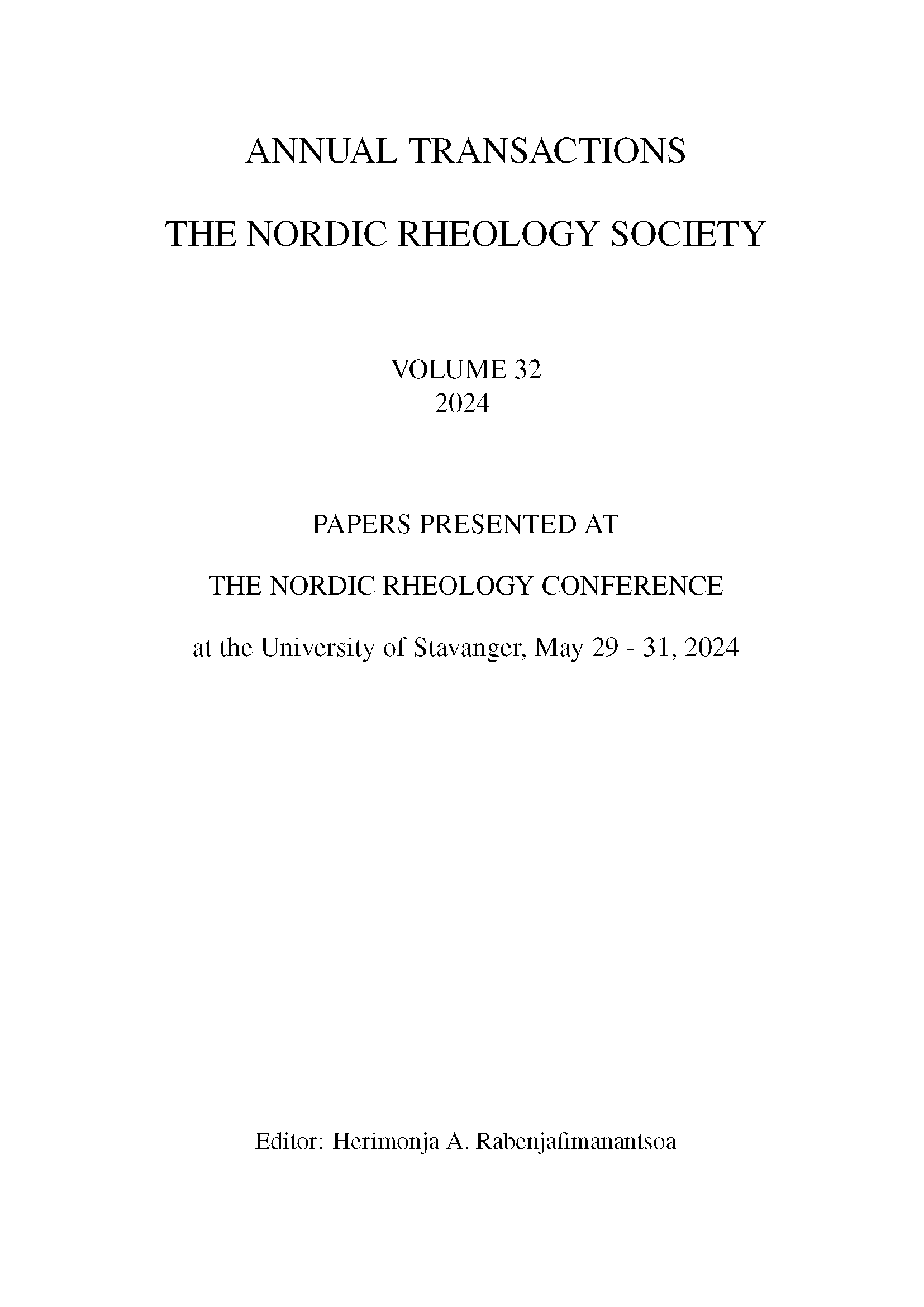Rheomicroscopy of Starch Gelatinisation
DOI:
https://doi.org/10.31265/atnrs.766Abstract
Rheomicroscopy offers simultaneous monitoring of microstructure through microscopy and rheology, in large deformation and small deformation oscillating shear as well as in compression. The method was used to visualise and explain starch gelatinisation and how it is affected by shear, granule architecture and botanical origin. Shear had a strong influence on paste viscosity and was explained by granule disruption following swelling. Gelatinisation occurred during narrower temperature range for potato starch than for maize starch, which in turn both had a different behaviour from wheat starch. A-type wheat starch was also shown to have different gelatinisation behaviour than B-type wheat starch.
References
Pérez S, Baldwin PM, Gallant DJ. Chapter 5 -Structural Features of Starch Granules I. In: BeMiller J, Whistler R, eds. Starch (Third Edition). Academic Press; 2009:149-192. https://doi.org/10.1016/B978-0-12-746275-2.00005-7
Fuentes C, Kang I, Lee J, et al. Fractionation and characterization of starch granules using fieldflow fractionation (FFF) and differential scanning calorimetry (DSC). Anal Bioanal Chem. Jun 2019;411(16):3665-3674. https://doi.org/10.1007/s00216-019-01852-9
Ao Z, Jane J-l. Characterization and modeling of the A-and B-granule starches of wheat, triticale, and barley. Carbohydrate Polymers. 2007/01/02/ 2007;67(1):46-55. https://doi.org/10.1016/j.carbpol.2006.04.013
Svegmark K, Hermansson A-M. Changes induced by shear and gel formation in the viscoelastic behaviour of potato, wheat and maize starch dispersions. Carbohydrate Polymers. 1991/01/01/ 1991;15(2):151-169. https://doi.org/10.1016/0144-8617(91)90030-G
Zeng J, Gao H, Li G. Functional properties of wheat starch with different particle size distribution. Journal of the Science of Food and Agriculture. 2014;94(1):57-62. https://doi.org/10.1002/jsfa.6186
Boitte J-B, Vizcaïno C, Benyahia L, Herry J-M, Michon C, Hayert M. A novel rheo-optical device for studying complex fluids in a double shear plate geometry. Review of Scientific Instruments. 2013;84(1) https://doi.org/10.1063/1.4774395
Villa S, Edera P, Brizioli M, Trappe V, Giavazzi F, Cerbino R. Quantitative rheo-microscopy of soft matter. Original Research. Frontiers in Physics. 2022-October-10 2022;10 https://doi.org/10.3389/fphy.2022.1013805
Picken SJ, Aerts J, Doppert HL, Reuvers AJ, Northolt MG. Structure and rheology of aramid solutions: transient rheological and rheooptical measurements. Macromolecules. 1991/03/01 1991;24(6):1366-1375. https://doi.org/10.1021/ma00006a023
Aime S, Ramos L, Fromental JM, Prévot G, Jelinek R, Cipelletti L. A stress-controlled shear cell for small-angle light scattering and microscopy. Rev Sci Instrum. Dec 2016;87(12):123907. https://doi.org/10.1063/1.4972253
Chan HK, Mohraz A. A simple shear cell for the direct visualization of step-stress deformation in soft materials. Rheologica Acta. 2013/05/01 2013;52(5):383-394. https://doi.org/10.1007/s00397-013-0679-5
Colombo G, Massaro R, Coleman S, Läuger J, Puyvelde PV, Vermant J. Ultrafast imaging of soft materials during shear flow. Korea-Australia Rheology Journal. 2019/11/01 2019;31(4):229-240. https://doi.org/10.1007/s13367-019-0023-4
Vidal LM, Ewigmann H, Schuster C, et al. Microscopic analysis of gluten network development under shear load combining confocal laser scanning microscopy with rheometry. Journal of Texture Studies. 2023;54(6):926-935. https://doi.org/10.1111/jtxs.12796
Besseling R, Isa L, Weeks ER, Poon WCK. Quantitative imaging of colloidal flows. Advances in Colloid and Interface Science. 2009/02/28/ 2009;146(1):1-17. https://doi.org/10.1016/j.cis.2008.09.008
Dutta SK, Mbi A, Arevalo RC, Blair DL. Development of a confocal rheometer for soft and biological materials. Review of Scientific Instruments. 2013;84(6) https://doi.org/10.1063/1.4810015
Sentjabrskaja T, Chaudhuri P, Hermes M, et al. Creep and flow of glasses: strain response linked to the spatial distribution of dynamical heterogeneities. Scientific Reports. 2015/07/08 2015;5(1):11884. https://doi.org/10.1038/srep11884
Koumakis N, Moghimi E, Besseling R, Poon WCK, Brady JF, Petekidis G. Tuning colloidal gels by shear. Soft Matter. 2015;11(23):4640-4648. https://doi.org/10.1039/C5SM00411J
Lin NY, McCoy JH, Cheng X, Leahy B, Israelachvili JN, Cohen I. A multi-axis confocal rheoscope for studying shear flow of structured fluids. Rev Sci Instrum. Mar 2014;85(3):033905. https://doi.org/10.1063/1.4868688
Singh A, Tateno M, Simon G, Vanel L, Leocmach M. Immersed cantilever apparatus for mechanics and microscopy. Measurement Science and Technology. 2021/08/27 2021;32(12):125603. https://doi.org/10.1088/1361-6501/ac1c1d
Park S-H, Chung OK, Seib PA. Effects of Varying Weight Ratios of Large and Small Wheat Starch Granules on Experimental Straight-Dough Bread. Cereal Chemistry. 2005;82(2):166-172. https://doi.org/10.1094/CC-82-0166
Almdal K, Dyre J, Hvidt S, Kramer O. Towards a phenomenological definition of the term 'gel'. Polymer Gels and Networks [0966-7822]. 1993;1(1):5-17. https://doi.org/10.1016/0966-7822(93)90020-I
Winter HH, Chambon F. Analysis of linear viscoelasticity of a crosslinking polymer at the gel point. J Rheol. 1986;30(2):367-382. https://doi.org/10.1122/1.549853

Downloads
Published
Issue
Section
License
Copyright (c) 2024 Mats Stading, Camilla Öhgren, Niklas Lorén

This work is licensed under a Creative Commons Attribution 4.0 International License.
